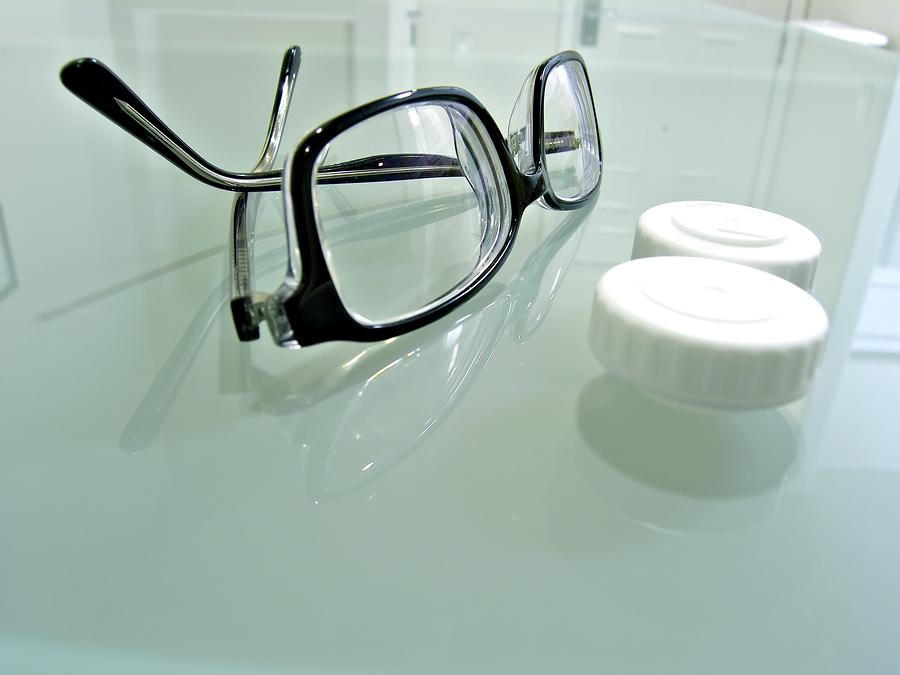Hard To Fit Contacts vs Regular Contacts

- posted: Jul. 23, 2019
Hard To Fit Contacts vs Regular Contacts
Many vision patients can use regular contacts to improve their vision. However, certain conditions prevent a person from wearing regular contacts because the standard shape, size, and material of contacts won't fit in their eyes. These conditions include:
- Keratoconus
- Astigmatism
- Dry eyes
- Giant papillary conjunctivitis (GPC)
- After surgery (such as LASIK)
- Presbyopia
Fortunately, hard-to-fit contacts may solve this issue. To determine if you may still be able to wear contact lenses, you'll want to work with an eye doctor in Wichita who specializes in contact fittings and hard-to-fit contacts as each of these conditions may require a different type of lens.
The major types of contact lenses are:
- Gas Permeable Lenses — rigid contacts that retain their shape while allowing oxygen to permeate the lens. These provide clearer sight for people whose vision becomes blurred from regular contacts. An eye doctor may prescribe this type of contact for keratoconus, astigmatism, dry eyes, papillary conjunctivitis and after LASIK surgery. Some people will wear a gas-permeable lens over a soft lens to preserve vision and comfort, a practice known as piggybacking.
- Scleral contact lenses — lenses with a larger diameter that fit over the white of the eye to reduce discomfort on the cornea. These contacts may be suitable for keratoconus or other conditions where the cornea is misshapen.
- Hybrid contacts — combine large diameters with a rigid central portion and a softer outer portion. They offer the best of all worlds. These lenses may be prescribed for keratoconus, nearsightedness, farsightedness, and astigmatism.
- Soft contacts — custom soft contacts that may be appropriate for keratoconus without causing discomfort to the wearer. They have a larger diameter and higher water count than typical lenses.
- Toric lenses — for astigmatism. They may be rigid or the more popular soft design.
- Bifocal contacts — work similarly to bifocal eyeglasses.
For some patients, their optometrist may recommend a combination of lenses to best accommodate different activities such as reading or driving.
Learn More About Hard-to-Fit Contacts
To determine if you're a candidate for any of these contacts, call Wichita Optometry, P.A. at (316) 942-7496.

- posted: Jul. 23, 2019
Hard To Fit Contacts vs Regular Contacts
Many vision patients can use regular contacts to improve their vision. However, certain conditions prevent a person from wearing regular contacts because the standard shape, size, and material of contacts won't fit in their eyes. These conditions include:
- Keratoconus
- Astigmatism
- Dry eyes
- Giant papillary conjunctivitis (GPC)
- After surgery (such as LASIK)
- Presbyopia
Fortunately, hard-to-fit contacts may solve this issue. To determine if you may still be able to wear contact lenses, you'll want to work with an eye doctor in Wichita who specializes in contact fittings and hard-to-fit contacts as each of these conditions may require a different type of lens.
The major types of contact lenses are:
- Gas Permeable Lenses — rigid contacts that retain their shape while allowing oxygen to permeate the lens. These provide clearer sight for people whose vision becomes blurred from regular contacts. An eye doctor may prescribe this type of contact for keratoconus, astigmatism, dry eyes, papillary conjunctivitis and after LASIK surgery. Some people will wear a gas-permeable lens over a soft lens to preserve vision and comfort, a practice known as piggybacking.
- Scleral contact lenses — lenses with a larger diameter that fit over the white of the eye to reduce discomfort on the cornea. These contacts may be suitable for keratoconus or other conditions where the cornea is misshapen.
- Hybrid contacts — combine large diameters with a rigid central portion and a softer outer portion. They offer the best of all worlds. These lenses may be prescribed for keratoconus, nearsightedness, farsightedness, and astigmatism.
- Soft contacts — custom soft contacts that may be appropriate for keratoconus without causing discomfort to the wearer. They have a larger diameter and higher water count than typical lenses.
- Toric lenses — for astigmatism. They may be rigid or the more popular soft design.
- Bifocal contacts — work similarly to bifocal eyeglasses.
For some patients, their optometrist may recommend a combination of lenses to best accommodate different activities such as reading or driving.
Learn More About Hard-to-Fit Contacts
To determine if you're a candidate for any of these contacts, call Wichita Optometry, P.A. at (316) 942-7496.
